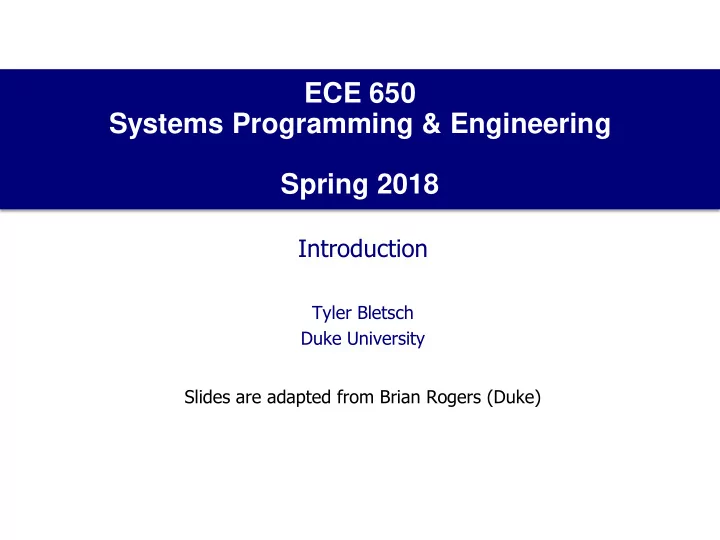

ECE 650 Systems Programming & Engineering Spring 2018 Introduction Tyler Bletsch Duke University Slides are adapted from Brian Rogers (Duke)
Welcome! • Welcome to ECE 650: Systems Programming & Engineering • Instructor • Prof. Tyler Bletsch • Can call me “Tyler” or “Dr. Bletsch” or whatever • Office hours will be on course page, and I also accept appointments • TAs • Siyang Chen, Yuchen Zhou • Office hours will be posted on class page 2
Getting Info • Course Web Page : static info http://people.duke.edu/~tkb13/courses/ece650/ • Syllabus, schedule, slides, assignments, rules/policies, prof/TA info, office hour info • Links to useful resources • Piazza : questions/answers • Post all of your questions here • Questions should be “public” unless good reason otherwise • No code in public posts! • Sakai : just assignment submission and gradebook 3
Overview of this Class • You have a foundation of knowledge in: • Computer architecture • Basics of OS and networking • Programming (strong C and C++ skills) • Unix development tools • Using these skills, we will learn to: • Write programs that relate to the design of operating systems • Write programs for system-level software 4
What is Systems Programming? • Of course we should consult Wikipedia! • Applications programming : services for users • Systems programming : services for other software • “System programming requires a great degree of hardware awareness.” User Application Applications programming Libraries, middleware, etc. Systems programming Operating System Hardware Computer architecture 5
Course Topics • Operating systems • Networking • Concurrency and inter-process • Link layer (hubs, switches, etc.) communication (IPC) • IP, routing review, BGP routing, • Interactions between user space UDP, TCP and kernel space • Flow and congestion control • Process management and • DNS, HTTP, ICMP scheduling • Databases • Security, malware, exploits • Tuples, tables, schema, relational • System boot process algebra • I/O systems • SQL basics, C programming, ACID, • File systems transactions, isolation • Virtual memory management for • Data organization, including B-trees the OS and indexing • Hypervisors: virtualizing the OS • Distributed hash tables • Distributed files systems • MapReduce and Hadoop 6
Grading Breakdown Assignment % Homeworks 55% Midterm Exam 15% Final Exam 30% Partial credit is available – provide detail in your answers to seek it! Late homework submissions incur penalties as follows: • Submission is 0-24 hours late: total score is multiplied by 0.9 ~6.6 × 10 -34 • Submission is 24-48 hours late: total score is multiplied by 0.8 • Submission is more than 48 hours late: total score is multiplied by the Planck constant (in J·s) NOTE: If you feel in advance that you may need an extension, contact the instructor. These assignments are looooooooooong. START EARLY. 7
Grade Appeals • All regrade requests must be in writing • Email the UTA who graded the question (we’ll indicate who graded what) • After speaking with the TA, if you still have concerns, contact the instructor • All regrade requests must be submitted no later than 1 week after the assignment was returned to you. 8
Grading Scale > 97 A+ 92-96.9 A 90-91.9 A- 87-89.9 B+ 82-86.9 B 80-81.9 B- 77-79.9 C+ 72-76.9 C 70-71.9 C- 67-69.9 D+ 62-66.9 D 60-61.9 D- < 70 F 9
*Example* Assignments • Security : develop a portion of a rootkit to hide the presence of malicious activity on a system • Concurrency : implement a thread-safe system library (e.g. memory allocation) • Networking : simulate an IP routing system • IPC : build an application consisting of multiple processes that must communicate and coordinate via an OS-supported IPC mechanism • Databases : create an SQL database and interact with it from a program 10
Academic Misconduct • Academic Misconduct • Refer to Duke Community Standard • Homework is individual – you do your own work • Common examples of cheating: • Running out of time and using someone else's output • Borrowing code from someone who took course before • Using solutions found on the Web • Having a friend help you to debug your program • I will not tolerate any academic misconduct! • Software for detecting cheating is very, very good … and I use it • I’ve referred over a dozen cases to the Office of Student Conduct; don’t be one of them! • “But I didn’t know that was cheating” is not a valid excuse 11
Academic Integrity for Assignments • Your work is expected to be your own • If you are unsure whether a certain course of action is permissible or not, please ask. • If you think that asking is a bad idea because I would probably say “no,” you can be fairly certain it is not permissible. 12
Our Responsibilities • The instructor and TAs will… • Provide lectures at the stated times • Set clear policies on grading • Provide timely feedback on assignments • Be available out of class to provide reasonable assistance • Respond to comments or complaints about the instruction provided • Students are expected to… • Receive lectures at the stated times • Turn in assignments on time • Seek out of class assistance in a timely manner if needed • Provide frank comments about the instruction or grading as soon as possible if there are issues • Assist each other within the bounds of academic integrity 13
The course website again http://people.duke.edu/~tkb13/courses/ece650/ 14
Let’s get started! 15
Recommend
More recommend